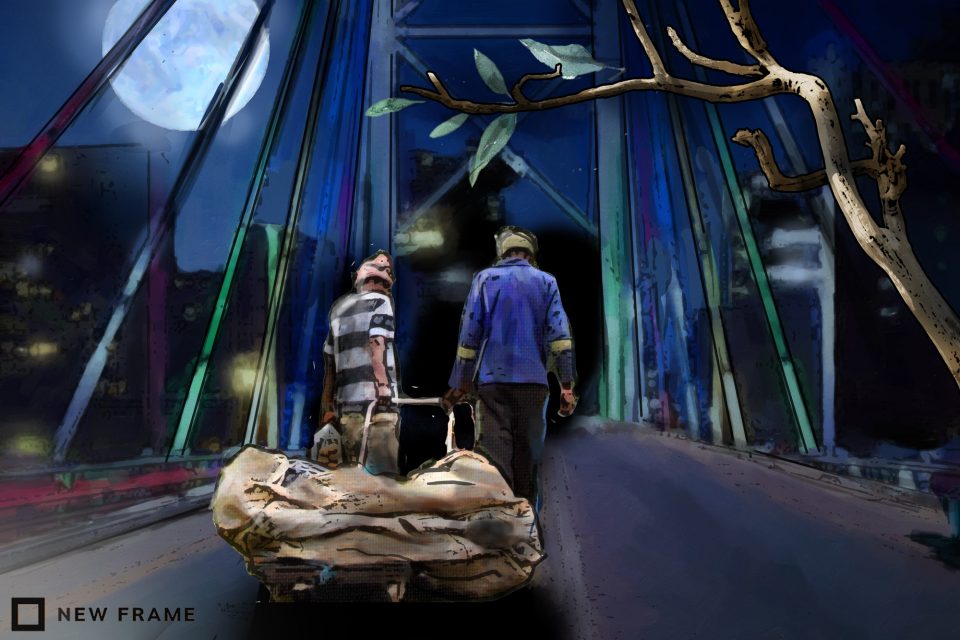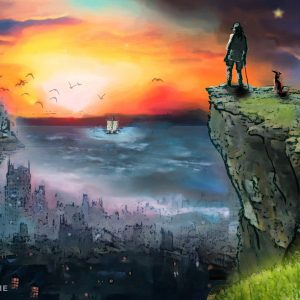Text Messages | Covid-19, a moment of pause
As the coronavirus contains what it is to be human, perhaps like the characters in Samuel Beckett’s Waiting for Godot we should take this time to question our purpose.
Author:
16 July 2020

A kangaroo word is one that with certain of its letters removed is found to contain another. Take a word of the moment, pandemic. Take out “dem” and you have panic, which happens to be one of the conditions most associated with pandemics.
When the novel coronavirus pandemic hit the world, there was a flurry of discussions and suggestions about which classic books on large-scale outbreaks of disease would be most helpful to read. The idea was that considered experience of previous plagues and killer viruses would be useful preparation for the isolation, quarantine, dissociation, death and destruction to come.
Related article:
But as it becomes apparent that not only is a vaccine some way off, but also that it might confer only limited, short-term immunity, the literary-helpmate debate needs revisiting. Timeless in its sense of humanity at its best and worst and ever wise though Albert Camus’ The Plague might be, it cannot fully prepare us to deal with this virus. That is because we are faced not with the cessation and disappearance of Covid-19, but with the protracted and nerve-wracking prospect of learning to live with it, of every day many times calculating the odds of infection inherent in every interaction, no matter how seemingly simple.
Suspended animation
As has been said by many, “There is no next.” Humankind lives now in a state of perpetual suspended animation, unable to trust in even the hint of a return to pre-Covid normality (in itself, a fractious and debatable term). Across the globe, the similarities are strikingly and depressingly similar. Open the bars and restaurants and churches, only to close them again. Relax restrictions only to reinstate lockdowns.
Related article:
To many, each day is the same, beginning with little hope or sense and ending the same way. Had its author not insisted on its being a tragicomedy, one work would encapsulate the sense of anticipation, of permanent uncertainty, of hopeful and hopeless waiting that is the world of Covid-19: Samuel Beckett’s Waiting for Godot.
Take these excerpts from Act One:
Vladimir: Words, words. (Pause.) Speak.
Boy: (in a rush). Mr Godot told me to tell you he won’t come this evening but surely tomorrow.
Silence.
And, at the end of the Act:
Estragon: Wait! (He moves away from Vladimir.) I wonder if we wouldn’t have been better off alone, each one for himself. (He crosses the stage and sits down on the mound.) We weren’t made for the same road.
Vladimir: (without anger) It’s not certain.
Estragon: No, nothing is certain.
Vladimir slowly crosses the stage and sits down beside Estragon.
Vladimir: We can still part, if you think it would be better.
Estragon: It’s not worth while now.
Silence
Vladimir: No, it’s not worth while now.
Silence
Estragon: Well, shall we go?
Vladimir: Yes, let’s go.
They do not move.
Beckett pared human existence to its essentials, not only in Waiting for Godot but in all his work that followed. And he did so through the eyes, ears and mouths of characters that represented humanity at its most fundamental. As the great Beckett scholar Martin Esslin put it:
“The two heroes of Waiting for Godot, for instance, are frequently referred to by critics as tramps, yet they were never described as such by Beckett. They are merely two human beings in the most basic situation of being in the world and not knowing what they are there for.”
Vladimir and Estragon, clowns of the human condition rather than vagrants, wrestle with that question of what we are here for. And so should we, as we struggle to make meaning and sense of being human in a world rendered less and less human by the virus.


